
This spring, 18 faculty members in the Duke University School of Medicine have been awarded distinguished professorships. The new distinguished professors will be honored at the annual distinguished professorship event on May 23.
In total, 32 new distinguished professors across Duke University were approved by the Board of Trustees in February.
Distinguished professorships are awarded to faculty who have demonstrated extraordinary scholarship in advancing science and improving human health.
The 2024 recipients from the School of Medicine are:
Michelle Winn, MD, Distinguished Professor
Lisa Amaya-Jackson, MD

Lisa Amaya-Jackson, MD, is a professor of psychiatry and behavioral sciences. She is a child and adolescent psychiatrist whose work focuses on child trauma, post-traumatic stress disorder, and bringing effective treatments to community providers and service systems. Her research and training interests center on national efforts to increase access and quality of services for children through policy, training, and clinical strategies to create an evidence based, trauma-informed, mental health workforce. She is co-director of the UCLA-Duke National Center for Child Traumatic Stress and director of Duke Psychiatry’s Evidence-based Practice Implementation Center.
James B. Duke Distinguished Professor

Huiman Xie Barnhart, PhD
Huiman Xie Barnhart, PhD, is a professor and associate chair for faculty mentorship and development in the Department of Biostatistics and Bioinformatics. Her research interests include both statistical methodology and disease-specific clinical research biostatistics. Her statistical research areas include methods for assessing reliability/agreement between methods or raters, evaluating performance of new medical diagnostic tests, missing data, correlated categorical data and methods for clinical trials. Her collaborative research interests include cardiovascular imaging, radiology imaging, cardiovascular disease, renal disease, reproductive medicine, Parkinson disease, and aging. She directs multiple Data Coordinating Centers and is highly active in the Duke Clinical Research Institute.
Gary Hock Distinguished Professor in Global Health

Chris Beyrer, MD, MPH
Chris Beyrer, MD, MPH, is a professor of medicine and the director of the Duke Global Health Institute. He is an epidemiologist who has worked on the front lines of HIV/AIDS and COVID-19 treatment and research. An authority on the study and control of HIV transmission on an international scale, he has led collaborative research on HIV epidemiology, prevention and treatment in Southeast Asia, Sub-Saharan Africa, and Eastern Europe and Central Asia for more than 30 years. He is past president of the International AIDS Society, the world’s largest body of HIV professionals.
Margaret Harris and David Silverman Distinguished Professor
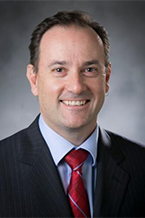
Simon Gregory, PhD
Simon Gregory, PhD, is a tenured professor and director of the Brain Tumor Omics Program in the Duke Department of Neurosurgery, vice chair of research in the Department of Neurology, and director of the Molecular Genomics Core at the Duke Molecular Physiology Institute. He elucidates the mechanisms underlying multi-factorial diseases using genetic, genomic, and epigenetic approaches. His primary research addresses disease development and progression in brain tumors and Alzheimer’s disease, white matter injury repair in multiple sclerosis, and social and behavioral response to oxytocin treatment in animal models of autism.
Samuel L. Katz Distinguished Professor of Pediatrics

Christoph Hornik, MD, PhD, MPH
Christoph Hornik, MD, PhD, MPH, a professor of pediatrics and Duke Clinical Research Institute (DCRI) faculty member, is the Department of Pediatrics vice chair for research, DCRI's Pharmacometrics program director, and i-Cubed, DCRI's Center for Clinical Research Innovation, associate director. As a pediatric cardiac intensivist, his research changes how clinical trials are conducted in small and vulnerable populations. He leverages his training and expertise in clinical cardiac critical care, biostatistics, clinical pharmacology, pharmacometrics, health services research, and innovative trials to develop novel and efficient methods that study cardiovascular drugs' dosing, efficacy, and safety in children.
Brenda E. Armstrong, M.D. Distinguished Professor

Kimberly S. Johnson, MD
Kimberly S. Johnson, MD, is a professor of medicine. Her research focuses on racial disparities in end‐of‐life and palliative care. Her topics of inquiry include: racial differences in hospice use and patterns of care; racial variation in knowledge and beliefs about hospice; best practices among hospices in reaching African Americans; interventions to reduce disparities in communication and advance care planning. She is the director of the Duke Center for Research to Advance Health Care Equity (REACH Equity), which develops and tests interventions to reduce racial and ethnic disparities by improving the quality of patient‐centered care in the clinical encounter.
Fred and Janet Sanfilippo Distinguished Professor
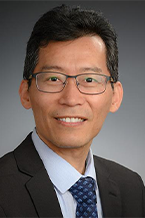
Hui-Kuan Lin, PhD
Hui-Kuan Lin, PhD, is a professor of pathology and director of prostate cancer research in the Department of Pathology. His research focuses on understanding oncogenic networks between oncogenes and tumor suppressor genes, dissecting the regulatory mechanisms underlying the crosstalk between ageing and cancer, and unraveling the role of posttranslational modifications and cancer metabolism in diverse molecular and biological processes important for cancer progression and metastasis, cancer stem regulation, cancer immunity and drug resistance. His research goals aim to reveal fundamental insights into cancer biology and immunity and to develop novel therapeutic strategies to target cancer and overcome immunotherapy resistance.
Boyce Haller Distinguished Professor in Nephrology

Xunrong Luo, MD, PhD
Xunrong Luo, MD, PhD, is a professor of medicine and Director of Translational Research in the Duke Transplant Center. She is a clinical transplant nephrologist whose research focuses on mechanisms for establishing and maintaining immune tolerance in transplantation. She pioneered a non-chimeric approach to establishing tolerance that leverages the body’s natural process of clearing self-apoptotic cells without triggering an inflammatory response. She discovered the critical role of anti-inflammatory efferocytic receptors in mediating transplantation tolerance, and she has identified immune signals that disturb the balance of immune regulation by viral infections that can reactivate the immune system against the transplanted organ.
Rebecca & John Kirkland Distinguished Professor

Michael Pignone, MD, MPH
Michael Pignone, MD, MPH, is a professor of medicine, vice chair for quality and innovation in the Department of Medicine, and faculty director of primary care transformation and innovation at Duke Margolis Center for Health Policy. As a clinician-investigator, he is focused on the intersection of primary care, quality improvement and health services research, particularly as it relates to health care equity. His research is focused on chronic disease screening and prevention. He is also director of a new program on cancer screening equity within Duke Cancer Institute and holds an American Cancer Society Clinical Research Professorship.
Lawrence C. Katz Distinguished Professor

Thomas Polascik, MD
Thomas Polascik, MD, is a professor in the Department of Urology. His research and clinical interests focus on prostate cancer imaging and outcomes, kidney cancer outcomes, robotic and minimally invasive surgery, and nerve-sparing cryotherapy. He is a world-recognized leader in the evolving discipline of focal therapy for the treatment of early-stage prostate cancer. Focal ablation of prostatic neoplasms without whole gland removal mitigates the side effects that commonly accompany more traditional radical prostatectomy. His work in this area has fundamentally transformed clinical practice both in the localization of and treatment of localized prostate cancer.
J. P. Gibbons Distinguished Professor of Psychiatry

Jonathan Posner, MD
Jonathan Posner, MD, is a professor of psychiatry and behavioral sciences. A child and adolescent psychiatrist, his research utilizes advanced MRI imaging to help characterize brain development and identify the biological basis of risk and resilience for mental illness in youth. He studies developmental trajectories of neural circuits, how these trajectories are impacted by adverse exposures, and how brain circuits are impacted by mental illness and treatment. He also explores the influence of family history, psychosocial adversity, and prenatal exposures on the development of neural circuits involved in executive functions and emotion regulation.
Norman L. Letvin M. D. Distinguished Professor in Surgery and the Duke Human Vaccine Institute

Kevin Saunders, PhD
Kevin Saunders, PhD, is a professor in surgery who also has appointments in integrative immunobiology and molecular genetics and microbiology. His research focuses on vaccine and antibody development to combat HIV-1 infection and coronavirus infections. As the associate director of the Duke Human Vaccine Institute (DHVI) and director of the DHVI Laboratory of Protein Expression, he focuses on two main areas of research: vaccine design and antibody isolation and engineering. Together, his research program is an interdisciplinary approach to understanding the molecular biology underlying antibody recognition of glycoproteins in order to produce protective vaccines.
Donald F. Fortin, M.D. Distinguished Professor of Cardiology
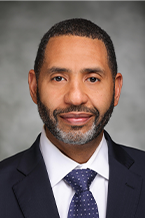
Kevin Thomas, MD
Kevin Thomas, MD, is a professor of medicine and vice dean for culture, engagement, and impact in the School of Medicine. As a cardiac electrophysiologist, his research expertise is addressing health disparities in racial and ethnic minorities with cardiovascular disease. He leads scientifically rigorous studies aimed at developing and testing interventions to reduce health inequities across a broad range of cardiac conditions and diseases. As vice dean, he creates and implements a broad range of policies and programs rooted in equity that foster a greater sense of belonging, engagement, and achievement.
A. Geller Distinguished Professor for Research in Immunology

Georgia Tomaras, PhD
Georgia Tomaras, PhD, is a professor in surgery, chief of the Division of Surgical Sciences in the Department of Surgery, director of the Duke Center for AIDS Research, and co-director of the Duke Center for Human Systems Immunology. Her primary research focus is deciphering mechanisms of protective human immunity and identification of immune correlates of protection to further development of effective vaccines against infectious diseases. Her laboratory’s goals are to reveal the specificities and functions of protective immune responses that lead to prevention or resolution of disease, including findings that directly contribute to the design and implementation of clinical trials.
Banks Anderson, Sr. Distinguished Professor
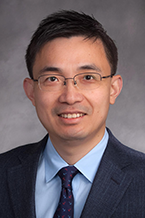
Qianben Wang, PhD
Qianben Wang, PhD, is a professor of pathology and cell biology. He has made significant contributions to gene regulatory mechanisms and gene therapy strategies in diseases. His research primarily focuses on understanding the transcriptional and epigenetic mechanisms driving the progression of hormone-dependent cancers. His work has reshaped single-gene-based thinking and introduced a genome-wide view of gene regulation in hormone-dependent cancer. His lab has pioneered the integration of CRISPR/Cas13-based technologies with nanotechnology to target undruggable transcriptional and post-transcriptional vulnerabilities in cancers. Additionally, his lab has initiated groundbreaking work in targeting host proteases to control infections caused by SARS-CoV-2 and related coronaviruses.
Duke School of Medicine Distinguished Professor in Neuroscience

Heather Whitson, MD, MHS
Heather Whitson, MD, MHS, is a professor of medicine and director of the Duke Center for the Study of Aging and Human Development. Her research focuses on improving care options for people with multiple chronic conditions, and on exploring how these conditions and aging biology impact physical resilience to health stressors. She studies how comorbidities, acute health stressors, and age-related biology interact to impact the aging brain and risk of cognitive decline. She leads the Duke/UNC Alzheimer’s Disease Research Center, and much of her work focuses on the interface between sensory impairment and brain changes.
Wilburt C. Davison Distinguished Professor

Kanecia Zimmerman, MD, MPH
Kanecia Zimmerman, MD, PhD, MPH, a professor of pediatrics, specializes in pediatric critical care medicine and is an expert in epidemiology, clinical trials innovation, drug safety, and regulatory processes. A Pediatric Trials Network steering committee member and former chair, she focuses on improving clinical trial life cycle participation, diversity, and family engagement. She co-founded the ABC Science Collaborative, developing and disseminating evidence-based guidance on coronavirus community spread in schools, and now leads NIH’s Long COVID clinical trial effort. Recently, she helped create the NC Community Schools Coalition, addressing social determinants of health in K-12 schools.
George Barth Geller Distinguished Professor
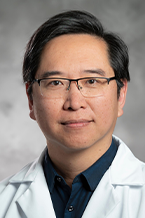
Lee Zou, PhD
Lee Zou, PhD, is a professor and chair of the Department of Pharmacology and Cancer Biology. His work primarily revolves around understanding the mechanisms of DNA damage and its implications in various diseases, including cancer. His research focuses on the signaling pathways associated with the maintenance of genomic integrity, specifically the checkpoint signaling system. He explores how DNA damage and DNA replication problems are detected by the ATM and ATR checkpoint pathways in human cells. His work has elucidated the mechanisms that activate the ATR checkpoints and functions in cancer cells, providing new opportunities for cancer therapy.
In addition, two School of Medicine faculty members awarded distinguished professorships that took effect on July 1, 2023, will also be honored at the ceremony:
Eugene and Marie Washington Presidential Distinguished Professor
Kafui Dzirasa, MD, PhD

Kafui Dziras, MD, PhD, is a professor of psychiatry and behavioral sciences and a professor of biomedical engineering. He is a pioneering researcher whose expertise in neuroscience, psychiatry, and engineering is transforming the understanding of the biological mechanisms of mental illness. He uses engineering approaches to uncover how changes in brain circuits lead to psychiatric illness, including depression, bipolar disorder, and addiction. He aims to develop new devices to repair brain circuits in individuals suffering from these devastating illnesses. He is also a national leader who has distinguished himself as an advocate for diversity and inclusion in science.
Paul G. Barash Distinguished Professor

Miriam Treggiari, MD
Miriam Treggiari, MD, is a professor and vice chair for research in the Department of Anesthesiology. Her research focuses on improving the outcomes of critical ill patients. She is an internationally recognized leader in clinical and outcomes research in perioperative settings, with a special emphasis on critically ill and neurocritical care patients. Her work has contributed to shaping societal guidelines on the management of sedation in critically ill patients, and her work to improve outcomes for patients with subarachnoid hemorrhage has contributed to the development of international guidelines for the management of these patients.